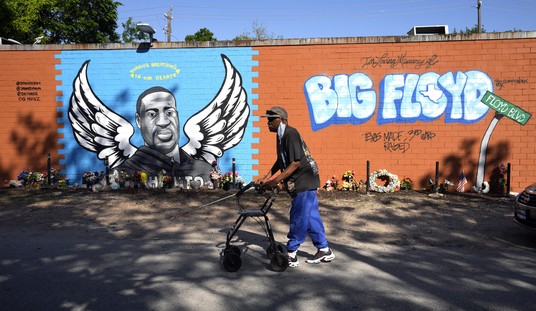Universal Basic Income (UBI) has been the ultimate utopian vision of the left for decades.
Think about it. The government sends you a check every month — just for being alive. No strings attached; spend the "free" money as you wish. Sounds awesome, doesn't it?
Yeah, no — for a multitude of reasons.
Among the reasons, utopia — an ideal society or place where everything is perfect, including social, political, economic, and moral conditions, which abounds with harmony, equality, and prosperity, and where suffering, injustice, and conflict — don't exist, has never existed, and will never exist.
Even more germane, as the old saying goes, there ain't no such thing as a free lunch.
The notion of the government funding a UBI system is a Democrat fabrication, promulgated by the left for decades for the eyes and ears of the low-information and less fortunate among us.
Given that the federal government doesn't make a dime — rather, it collects taxes in various forms — Universal Basic Income is, more accurately, Universal Basic Wealth Redistribution.
As various Democrat-run cities are already implementing UBI systems, a new study finds (as have several prior studies) that UBI has not achieved significant improvements for recipients, and has, on the contrary, led to negative consequences for many.
I know: Try to control your shock and amazement.
Check it out:
A new National Bureau of Economic Research working paper, titled The Impact of Unconditional Cash Transfers on Parenting and Children, found that UBI recipients increased spending, including a 13 percent rise in child-related expenses, but saw no improvement in school performance, not to mention an increase in reported developmental and stress-related issues in children.
Also, a Compton, California, study — the Compton Pledge — found that many recipients of a $500 monthly UBI payment stopped working part-time jobs, while the OpenResearch Unconditional Income Study (ORUS), an experiment in which lower-income Americans were given $1,000 a month for three years, resulted in a reduction in work and an increase in leisure activities.
Don't get me wrong: less work and more leisure time — let's call it "balance" — is, or at least can be, a good thing. But people taking off work to spend more time on the taxpayer dime, not so much.
There have been other studies with similar results to the above, the reason for which boils down to two words: human nature — in many cases, at least.
Generally speaking, doling out "free" money to the less-than-motivated among us can disincentivize work or lead to some people not working as hard or as much as they otherwise would. The logic is basic:
If basic needs are met without working, some individuals— especially those in low-wage, undesirable jobs— may opt out of the labor force or reduce their hours.
ALSO READ: Texas County's New Basic Income Program Is Not Going to Work
Low-Income Families in Oakland Eligible for Free Money! Unless You're White, That Is
The Nature of the Democrat Party
As I suggested, human nature, in many cases, leads to the failure of the utopian vision of Universal Basic Income, but what about Democrat Party?
More than six decades ago, President Lyndon B. Johnson declared an unconditional war on poverty in America, vowing during his 1964 State of the Union address to reduce, if not eliminate, poverty, and increase the standard of living for all Americans — almost entirely from wealth-redistribution schemes to low-income households.
So how'd that all work out? As the Heritage Foundation reported in 2014, the War on Poverty was a failure:
Since [1964 through 2014], the taxpayers have spent $22 trillion on Johnson's war. Adjusted for inflation, that's three times the cost of all military wars since the American Revolution.
[In 2013], government spent $943 billion dollars providing cash, food, housing, and medical care to poor and low-income Americans. (That figure doesn't include Social Security or Medicare.) More than 100 million people, or one-third of Americans, received some type of welfare aid, at an average cost of $9,000 per recipient. If converted into cash, this spending was five times what was needed to eliminate all poverty in the U.S.The [2014] U.S. Census Bureau ... claims that in 2013, 14.5 percent of Americans were poor. Remarkably, that's almost the same poverty rate as in 1967, three years after the War on Poverty started. How can that be? How can government spend $9,000 per recipient and have no effect on poverty? The answer is - it can't.
Eleven years after that Census Bureau report, and adjusted for inflation, the answer remains the same: It can't work.
Author and political commentator Jonathan Turley wrote on Wednesday about his forthcoming book, Rage and the Republic: The Unfinished Story of the American Revolution, in which he explores "how the American republic can survive in the 21st Century given unprecedented economic, technological, and political changes." The book addresses the increasing calls for a universal basic income (UBI).
Turley noted:
As various cities like New York move toward socialist candidates and programs, these studies offer a cautionary tale as officials push UBI payments.
Democrats aren't exactly interested in "cautionary tales," particularly when such tales — or facts — run counter to the left's various narratives and initiatives, as evidenced by one of my favorite political cartoons about socialism:
Democrat Party unavailable for comment. pic.twitter.com/YHCQTaYYgo
— MikesRight (@RealLibSmacker) August 7, 2025
The Bottom Line
While it can be argued that both the Democrat Party and Republican Party attempt to "buy" the votes of the American people — through campaign ads and various initiatives — the Democrats, for at least 60-plus years, have tried their damnedest to do so via blatant wealth redistribution.
Universal Basic Income — peddled to low-income Americans by the left as the nirvana of income — is a scam. You know, just like the whole nonsense about "the rich" not paying their "fair share."














